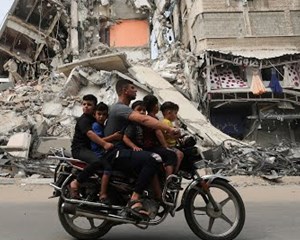AMNA NAWAZ: Well, the shooting has stopped, but the war of words goes on. Late today, Secretary of State Anthony Blinken spoke with Palestinian Authority President Mahmoud Abbas to pledge U.S. humanitarian assistance and discuss maintenance of the cease-fire. Abbas governs on the West Bank and has no authority in Gaza. Israel and Hamas, meanwhile, offered sharply different versions today of who won and who lost in this, their fourth conflict in just over a dozen years. John Yang reports on day one of the cease-fire.
JOHN YANG: The sounds of celebration replaced the echoes of artillery fire and rockets, as the fragile truce largely held for its first full day. Thousands of Palestinians rallied in Gaza, declaring victory over Israel, after 11 days of fighting.
MOHAMMED AL-ATTAR, Beit Lahiya Resident (through translator): This is a liberation. We won. We broke their pride. I hope God will protect the resistance.
JOHN YANG: A senior Hamas official in Gaza City had a message for Israel.
KHALIL AL-HAYYA, Senior Hamas Official (through translator): Netanyahu, the Zionist enemy, and his army said that they would destroy the tunnels above our resistance. And I tell him today that our fighters are now striding proudly in the tunnels.
JOHN YANG: Hamas' leader Ismail Haniyeh also thanked Iran for supplying weapons to Gaza. Hundreds of Hamas supporters marched in Khan Yunis after Friday prayers. There were also celebrations in the West Bank and East Jerusalem. At the same time, Israeli Prime Minister Benjamin Netanyahu declared his own victory.
BENJAMIN NETANYAHU, Israeli Prime Minister (through translator): When we embarked together on the campaign, I defined its main goal to land a hard blow on the terror organizations, to harm their capabilities and restore calm, while establishing our deterrence. And that is exactly what we did.
JOHN YANG: But he also sounded a warning:
BENJAMIN NETANYAHU (through translator): If Hamas thinks we will tolerate a drip of rockets, it is wrong. We will respond in a different power to any show of aggression against the communities surrounding Gaza or anywhere else in the state of Israel.
JOHN YANG: The truce was tested today when Palestinians threw rocks and Molotov cocktails at Israeli police outside Jerusalem's Al-Aqsa Mosque compound. Officers fired back with stun grenades. Palestinian protesters also clashed with Israeli security forces in the West Bank city of Hebron. Netanyahu is facing criticism from Israelis, who say he ended the assault too soon.

MARK DAN KIRI, Israeli Student: I'm against the cease-fire with Gaza. I think we should continue the fighting, continue the fighting until Hamas will collapse totally. It's only a matter of time until the next operation in Gaza.
JOHN YANG: Others welcomed the calm.
ARKADY MESHAYEV, Sderot Resident (through translator): Finally, there is a cease-fire. Hopefully, there will be peace in the country. I'm sick of this mess. What can I say? Let there be peace.
JOHN YANG: Tens of thousands of Gazans were forced to flee their homes during the conflict. Some like Hasan Alyan returned today for the first time to see the damage.
HASAN ALYAN, Gaza Resident (through translator): Look at the rubble and broken glass. Look at this ceiling. It's gone. My house was destroyed. If I had rooms built from concrete, I would have saved my kids inside them and wouldn't have fled the house.
JOHN YANG: The World Health Organization took stock of the toll on Gaza's already strained health care system.
DR. MARGARET HARRIS, World Health Organization: We have recorded significant trauma needs. And substantial fatalities and injuries are overwhelming the health facilities; 33 percent of essential medical supplies are at zero stock. So, even if the hospitals and clinics were functioning, they wouldn't be able to provide the care and services fully anyway.
JOHN YANG: The WHO said 30 Gaza health facilities were damaged, including one that was completely leveled. The European Union also welcomed an end to the bloodshed, but it insisted that only a political solution would bring lasting peace. In recent days, President Biden had stepped up pressure on Netanyahu to de-escalate the violence, and Secretary of State Antony Blinken will soon head to the region. State Department spokesman Ned Price:
NED PRICE, Spokesperson, State Department: For the past 10 or 11 days, we have been focused on bring about an end to the violence, achieving a cease-fire. During the same period, we have engaged in intense planning for what comes next.
JOHN YANG: Price also acknowledged the long road that lies ahead.
NED PRICE: No one here is under any illusions that a two-state solution, that final status negotiations are on the docket for later this week, or later this month, or maybe even later this year. So, our goal in the meantime is do what we can to improve lives, to build confidence, to instill opportunity and some degree of hope in the Palestinian people, so that, together, they can work constructively with Israelis.
JOHN YANG: A goal that has frustrated so many White Houses in the past. For the "PBS NewsHour," I'm John Yang.













